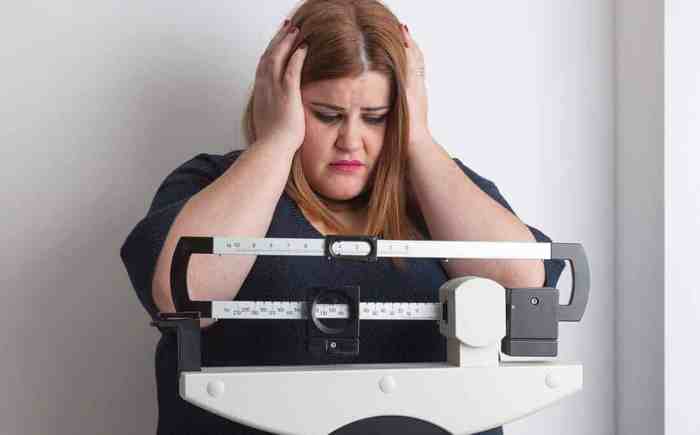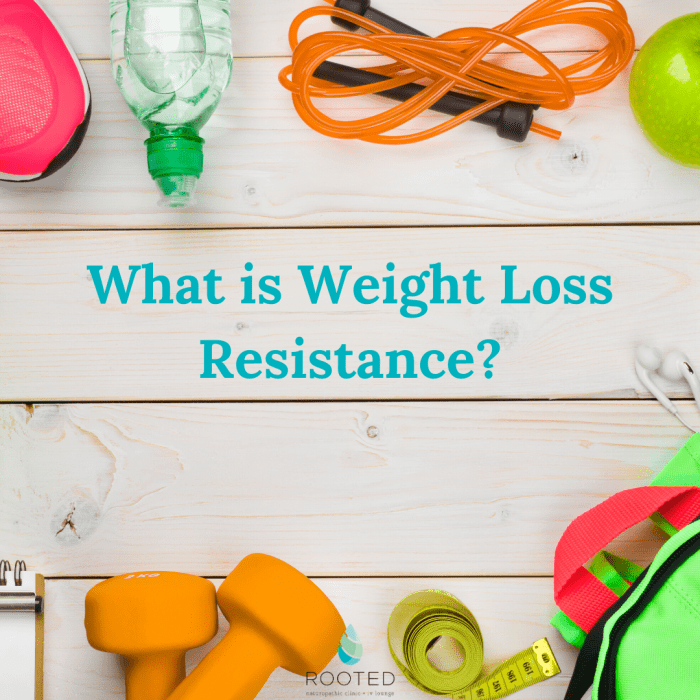Weight loss resistance over 40 – As we navigate the milestones of life, our bodies undergo a series of physiological changes, and one significant shift that many individuals over 40 encounter is weight loss resistance. This phenomenon, characterized by the body’s increased resistance to losing weight despite adhering to traditional weight loss strategies, can be a frustrating and disheartening obstacle.
However, understanding the underlying factors that contribute to weight loss resistance over 40 is the key to unlocking successful weight management and achieving your health goals.
Delving into the complexities of weight loss resistance over 40, this comprehensive guide will provide evidence-based insights, practical strategies, and inspiring success stories to empower you on your journey towards a healthier and more fulfilling life.
Weight Loss Resistance Over 40
Weight loss resistance over 40 is a common challenge faced by many individuals. As we age, our bodies undergo physiological changes that can make it more difficult to lose weight. These changes include a decrease in metabolism, a loss of muscle mass, and hormonal imbalances.
Additionally, lifestyle factors such as stress, lack of sleep, and poor diet can further contribute to weight loss resistance.
Overcoming Weight Loss Resistance
Overcoming weight loss resistance over 40 requires a multifaceted approach that addresses both physiological and lifestyle factors. Here are some evidence-based recommendations:
- Focus on building muscle mass:Muscle burns more calories than fat, so increasing muscle mass can help boost metabolism and promote weight loss.
- Engage in regular exercise:Aim for at least 150 minutes of moderate-intensity exercise or 75 minutes of vigorous-intensity exercise per week.
- Adopt a healthy diet:Prioritize whole, unprocessed foods such as fruits, vegetables, and lean protein. Limit processed foods, sugary drinks, and unhealthy fats.
- Manage stress:Stress can lead to hormonal imbalances that promote weight gain. Find healthy ways to manage stress, such as exercise, yoga, or meditation.
- Get enough sleep:Sleep deprivation can disrupt hormones that regulate appetite and metabolism.
– Discuss the impact of decreased muscle mass on metabolism and weight loss.
As we age, our muscle mass naturally decreases. This is due to several factors, including hormonal changes, decreased physical activity, and poor nutrition. The loss of muscle mass has a significant impact on our metabolism and weight loss efforts.
Muscle is metabolically active tissue, meaning it burns calories even at rest. When we lose muscle mass, we lose the ability to burn calories as efficiently. This can make it more difficult to lose weight and keep it off.
Strategies for Increasing Muscle Mass
- Resistance training: Resistance training, such as weight lifting or bodyweight exercises, helps to build and maintain muscle mass. Aim for at least two to three sessions of resistance training per week.
- Protein intake: Protein is essential for muscle growth and repair. Make sure to consume enough protein throughout the day, especially after resistance training.
- Creatine: Creatine is a natural substance that can help to increase muscle mass and strength. It is available as a supplement and can be taken before or after resistance training.
Hormonal Imbalances: Weight Loss Resistance Over 40
As we age, our bodies undergo several hormonal changes that can significantly impact our metabolism and weight management. Understanding these changes and their effects on weight loss is crucial for individuals over 40.
Estrogen and Progesterone
In women, declining levels of estrogen and progesterone during menopause can lead to a decrease in metabolism and an increase in body fat. Estrogen plays a vital role in regulating appetite, while progesterone helps control blood sugar levels. Imbalances in these hormones can result in weight gain, particularly around the abdomen.
Hey there, weight loss warriors over 40! We know the struggle is real when it comes to shedding those extra pounds. But don’t give up yet! Check out this awesome guide on Maintaining weight loss after 40 . It’s packed with tips and tricks to help you overcome the resistance and keep those pesky pounds off for good.
Let’s conquer this weight loss resistance over 40 together!
Testosterone
In men, testosterone levels gradually decline with age. Testosterone is essential for maintaining muscle mass and metabolism. As testosterone levels decrease, muscle mass may decrease, leading to a slower metabolism and increased difficulty losing weight.
Thyroid Hormones
Thyroid hormones, produced by the thyroid gland, regulate metabolism. Hypothyroidism, a condition where the thyroid gland produces insufficient hormones, can lead to weight gain, fatigue, and constipation. Hyperthyroidism, on the other hand, can cause weight loss, increased heart rate, and anxiety.
Hey there, ladies! If you’re over 40 and struggling to shed those extra pounds, don’t despair! While weight loss resistance can be a real pain, there are ways to overcome it. One option to consider is exploring Weight loss supplements for women over 40 . These supplements can provide your body with the extra boost it needs to burn fat and lose weight.
But remember, supplements alone won’t do the trick. You still need to make healthy lifestyle choices and exercise regularly to see lasting results. So, don’t give up on your weight loss journey just yet. With a little help from supplements and a positive attitude, you can achieve your weight loss goals and feel fabulous at any age!
Identifying Symptoms of Hormonal Imbalances
Recognizing the symptoms of hormonal imbalances is essential for addressing weight loss resistance. Some common symptoms include:
- Changes in weight (gain or loss)
- Difficulty losing weight despite diet and exercise
- Changes in appetite
- Mood swings
- Fatigue
- Skin changes
- Hair loss or thinning
Addressing Hormonal Imbalances
If you suspect you may have a hormonal imbalance, it is crucial to consult a healthcare professional. They can perform blood tests to assess hormone levels and recommend appropriate treatment options. These may include lifestyle changes, such as diet and exercise, or medications like hormone replacement therapy (HRT).
Body Composition Changes
As we age, our bodies undergo several physiological changes that can impact our weight loss efforts. One significant change is the alteration in body composition, which includes a loss of muscle mass and an increase in body fat.
Loss of Muscle Mass
After the age of 40, we naturally lose muscle mass at a rate of about 1-2% per year. This loss is primarily due to a decline in muscle protein synthesis and an increase in muscle protein breakdown.
The loss of muscle mass has several implications for weight loss:
- Reduced Metabolism:Muscle is metabolically active, meaning it burns calories even at rest. As muscle mass decreases, so does our metabolism, making it harder to burn calories and lose weight.
- Hormonal Imbalances:Muscle mass plays a role in hormone regulation. Loss of muscle mass can lead to imbalances in hormones like growth hormone and testosterone, which can further contribute to weight gain.
- Mobility and Health:Muscle loss can lead to decreased mobility, reduced balance, and increased risk of falls. It can also impair our ability to perform daily activities and increase the risk of chronic diseases like osteoporosis.
Increase in Body Fat
In addition to losing muscle mass, we also tend to gain body fat as we age. This is partly due to a decrease in physical activity and a change in dietary habits. The increase in body fat can further contribute to weight gain and make it harder to lose weight.
The following table summarizes the key changes in body composition that occur over 40:
| Age Group | Muscle Mass | Body Fat |
|---|---|---|
| 20-39 | Stable or slight increase | Stable or slight increase |
| 40-59 | Gradual decline | Moderate increase |
| 60+ | Significant decline | Substantial increase |
“Maintaining muscle mass as we age is crucial for overall health and well-being. It helps preserve our metabolism, balance hormones, and improve mobility.”– Dr. Michael Mosley, Author of “The Fast 800 Diet”
Lifestyle Factors
Lifestyle factors play a significant role in weight loss resistance over 40. These factors can influence metabolism, hormone production, and overall health, making it more challenging to lose weight. Understanding these factors and making necessary modifications can help improve weight loss efforts.
Dietary Changes, Weight loss resistance over 40
Dietary changes can significantly impact weight loss resistance. As we age, our bodies require fewer calories to maintain weight. However, many people continue to consume the same number of calories or even more, leading to weight gain. Additionally, unhealthy dietary choices, such as processed foods, sugary drinks, and excessive alcohol consumption, can contribute to inflammation and hormonal imbalances, further hindering weight loss.
Tips for modifying dietary changes:
- Reduce calorie intake gradually to avoid metabolic slowdown.
- Focus on consuming nutrient-rich foods such as fruits, vegetables, lean proteins, and whole grains.
- Limit processed foods, sugary drinks, and unhealthy fats.
- Stay hydrated by drinking plenty of water throughout the day.
Exercise Habits
Regular exercise is crucial for maintaining a healthy weight. Exercise helps build muscle mass, which boosts metabolism and calorie burn. However, as we age, our muscle mass naturally decreases, making it more difficult to lose weight. Additionally, sedentary lifestyles can contribute to weight gain and other health issues.
Tips for modifying exercise habits:
- Engage in regular physical activity, aiming for at least 150 minutes of moderate-intensity exercise or 75 minutes of vigorous-intensity exercise per week.
- Incorporate resistance training exercises to build muscle mass.
- Find enjoyable activities to make exercise sustainable.
- Set realistic fitness goals and gradually increase intensity and duration.
Sleep Patterns
Sleep is essential for overall health and weight management. When we don’t get enough sleep, our bodies produce more of the stress hormone cortisol, which can lead to increased appetite and cravings for unhealthy foods. Additionally, sleep deprivation can disrupt hormone production, further contributing to weight gain.
Tips for modifying sleep patterns:
- Aim for 7-9 hours of quality sleep each night.
- Establish a regular sleep-wake cycle, even on weekends.
- Create a relaxing bedtime routine to promote sleep.
- Avoid caffeine and alcohol before bed.
Stress Levels
Chronic stress can significantly impact weight loss resistance. When we’re stressed, our bodies release cortisol, which can lead to increased appetite and cravings for sugary and fatty foods. Additionally, stress can disrupt sleep patterns, hormone production, and overall health.
Tips for managing stress levels:
- Identify sources of stress and develop coping mechanisms.
- Practice relaxation techniques such as yoga, meditation, or deep breathing.
- Connect with friends and family for support.
- Consider seeking professional help if stress is overwhelming.
Other Lifestyle Factors
Other lifestyle factors can also contribute to weight loss resistance over 40, including:
- Smoking:Smoking damages blood vessels and reduces blood flow to muscles, making it more difficult to build muscle mass.
- Alcohol consumption:Excessive alcohol consumption can lead to weight gain and interfere with hormone production.
- Medications:Certain medications, such as antidepressants and steroids, can cause weight gain as a side effect.
- Medical conditions:Underlying medical conditions, such as hypothyroidism and Cushing’s syndrome, can contribute to weight gain and make it more challenging to lose weight.
| Lifestyle Factor | Impact on Weight Loss Resistance |
|---|---|
| Dietary Changes | Unhealthy dietary choices can contribute to inflammation and hormonal imbalances, making weight loss more difficult. |
| Exercise Habits | Decreased muscle mass due to sedentary lifestyles and aging can reduce metabolism and calorie burn. |
| Sleep Patterns | Sleep deprivation can disrupt hormone production and increase appetite, leading to weight gain. |
| Stress Levels | Chronic stress releases cortisol, which can increase appetite and cravings for unhealthy foods. |
| Other Lifestyle Factors | Smoking, excessive alcohol consumption, certain medications, and underlying medical conditions can contribute to weight gain. |
Key Findings:Lifestyle factors play a significant role in weight loss resistance over 40. Modifying these factors, such as dietary changes, exercise habits, sleep patterns, stress levels, and other lifestyle factors, can help improve weight loss efforts.
Dietary Strategies for Overcoming Resistance
Dietary strategies play a crucial role in overcoming weight loss resistance over 40. As we age, our metabolism slows down, and hormonal imbalances can affect our weight management efforts. Adopting nutrient-rich diets, practicing portion control, and staying hydrated are essential components of a successful weight loss journey.
Nutrient-Rich Foods
- Fruits and vegetables:Rich in fiber, antioxidants, and vitamins, fruits and vegetables promote satiety, boost metabolism, and reduce inflammation.
- Lean protein:Protein helps build and maintain muscle mass, which is essential for a healthy metabolism. Lean protein sources include chicken, fish, beans, and tofu.
- Whole grains:Whole grains provide complex carbohydrates, fiber, and essential nutrients. They promote blood sugar stability and keep you feeling full for longer.
Portion Control
Overeating is a common obstacle to weight loss. Practicing portion control helps manage calorie intake and prevent overconsumption. Use measuring cups and spoons, read food labels, and avoid distractions while eating.
Hydration
Staying hydrated is crucial for overall health and weight management. Drinking plenty of water can boost metabolism, suppress appetite, and flush out toxins.
Exercise Considerations
Overcoming weight loss resistance over 40 requires a comprehensive approach that includes regular exercise. Certain types of exercise are particularly effective in boosting metabolism, building muscle, and enhancing overall fitness.
Strength Training
Strength training is crucial for preserving and building muscle mass. As we age, muscle mass naturally declines, leading to a decrease in metabolism. By engaging in resistance exercises like weightlifting, bodyweight exercises, or resistance band workouts, you can stimulate muscle growth and increase your metabolic rate.
Cardiovascular Exercise
Cardiovascular exercise, such as brisk walking, running, cycling, or swimming, elevates your heart rate and promotes fat burning. Aim for at least 150 minutes of moderate-intensity cardio or 75 minutes of vigorous-intensity cardio per week.
Flexibility
Flexibility exercises, like yoga, stretching, or tai chi, improve range of motion, reduce muscle stiffness, and enhance overall mobility. Incorporating flexibility into your routine can complement your strength and cardio workouts and promote better overall fitness.
Sleep Optimization
Sleep is often overlooked when it comes to weight loss, but it plays a crucial role in regulating metabolism, hormone balance, and overall health. Poor sleep can sabotage your weight loss efforts, while optimizing sleep can boost your metabolism and support weight management.
One of the reasons why sleep is important for weight loss is that it helps regulate hormones that control appetite and metabolism. For example, when you’re sleep-deprived, your body produces more of the hormone ghrelin, which stimulates hunger, and less of the hormone leptin, which signals fullness.
This hormonal imbalance can lead to increased appetite and cravings, making it harder to stick to a healthy diet.
Recommended Hours of Sleep
The amount of sleep you need varies depending on your age. According to the National Sleep Foundation, adults should aim for 7-9 hours of sleep per night. Children and teenagers need even more sleep, with the recommended amount ranging from 9-11 hours per night.
| Age Group | Recommended Hours of Sleep |
|---|---|
| Newborns (0-3 months) | 14-17 hours |
| Infants (4-11 months) | 12-15 hours |
| Toddlers (1-2 years) | 11-14 hours |
| Preschoolers (3-5 years) | 10-13 hours |
| School-aged children (6-13 years) | 9-11 hours |
| Teenagers (14-17 years) | 8-10 hours |
| Young adults (18-25 years) | 7-9 hours |
| Adults (26-64 years) | 7-9 hours |
| Older adults (65 years and older) | 7-8 hours |
Common Sleep Disorders
There are several common sleep disorders that can interfere with weight loss, including:
- Insomnia: Difficulty falling or staying asleep
- Sleep apnea: A condition in which breathing repeatedly stops and starts during sleep
- Restless legs syndrome: A condition that causes an irresistible urge to move your legs
- Narcolepsy: A condition that causes excessive daytime sleepiness
If you have any of these sleep disorders, it’s important to see a doctor to get treatment. Treating the underlying sleep disorder can improve your sleep quality and help you lose weight.
Creating a Relaxing Bedtime Routine
To promote restful sleep, it’s important to create a relaxing bedtime routine. This could include:
- Going to bed and waking up at the same time each day, even on weekends
- Creating a relaxing bedtime routine, such as taking a warm bath, reading a book, or listening to calming music
- Avoiding caffeine and alcohol before bed
- Making sure your bedroom is dark, quiet, and cool
Sleep Hygiene
Sleep hygiene refers to the habits and practices that promote good sleep. Good sleep hygiene can help you fall asleep more easily, stay asleep throughout the night, and wake up feeling refreshed. Some tips for good sleep hygiene include:
- Establish a regular sleep-wake cycle, even on weekends
- Avoid caffeine and alcohol before bed
- Create a relaxing bedtime routine
- Make sure your bedroom is dark, quiet, and cool
- Get regular exercise, but avoid working out too close to bedtime
- See a doctor if you have any sleep problems
Stress Management Techniques
Stress is a major factor that can hinder weight loss, especially over the age of 40. When we’re stressed, our bodies release the hormone cortisol, which can increase appetite and lead to weight gain. Additionally, stress can lead to unhealthy coping mechanisms like emotional eating, further contributing to weight gain.
To overcome this, it’s crucial to implement effective stress management techniques that can help reduce cortisol levels and promote weight loss. Mindfulness, meditation, and yoga are some of the most effective methods to combat stress.
Mindfulness
Mindfulness is the practice of paying attention to the present moment without judgment. It can help reduce stress levels by bringing awareness to our thoughts and feelings, allowing us to process them in a healthier way.
Meditation
Meditation is a practice that involves focusing on a specific thought, object, or activity to train attention and awareness. Regular meditation has been shown to reduce stress, improve sleep, and promote emotional regulation.
Yoga
Yoga is a mind-body practice that combines physical postures, breathing exercises, and meditation. It has been shown to reduce stress levels, improve flexibility and balance, and promote overall well-being.
Explain how certain medical conditions, such as hypothyroidism and PCOS, can contribute to weight loss resistance.
Medical conditions can significantly impact metabolism and weight loss efforts. Two common conditions that can contribute to weight loss resistance are hypothyroidism and PCOS.
Hypothyroidism
Hypothyroidism is a condition in which the thyroid gland does not produce enough thyroid hormone. Thyroid hormone is essential for regulating metabolism, and when levels are low, metabolism can slow down, making it more difficult to lose weight.
- Symptoms of hypothyroidism can include fatigue, weight gain, constipation, and dry skin.
- Diagnosis of hypothyroidism typically involves a blood test to measure thyroid hormone levels.
- Treatment for hypothyroidism involves taking thyroid hormone replacement medication.
PCOS
PCOS is a hormonal disorder that affects women of reproductive age. PCOS can lead to weight gain, insulin resistance, and difficulty losing weight.
- Symptoms of PCOS can include irregular periods, acne, excessive hair growth, and weight gain.
- Diagnosis of PCOS typically involves a combination of blood tests, pelvic exams, and ultrasound.
- Treatment for PCOS may include lifestyle changes, medication, or surgery.
It is important to seek medical advice if you are experiencing symptoms of hypothyroidism or PCOS, as these conditions can impact your weight loss efforts and overall health.
Medications
Medications can play a significant role in weight gain and hinder weight loss efforts. Certain medications, such as antidepressants, antipsychotics, and steroids, have side effects that can disrupt metabolism and increase appetite.
Understanding the potential impact of medications on weight is crucial. Here’s a comprehensive list of medications that can contribute to weight gain and weight loss resistance:
Antidepressants
- Selective serotonin reuptake inhibitors (SSRIs): Fluoxetine (Prozac), Sertraline (Zoloft), Paroxetine (Paxil)
- Tricyclic antidepressants (TCAs): Amitriptyline (Elavil), Imipramine (Tofranil)
- Monoamine oxidase inhibitors (MAOIs): Phenelzine (Nardil), Tranylcypromine (Parnate)
Antidepressants can cause weight gain by increasing appetite, slowing metabolism, and disrupting hormone levels.
Case Studies and Success Stories
Weight loss resistance over 40 can be overcome, as evidenced by numerous success stories of individuals who have achieved their weight loss goals. These case studies offer valuable insights into the strategies and lifestyle changes that can lead to successful weight management.
One common theme among these success stories is the adoption of a balanced and nutritious diet, coupled with regular exercise. Individuals who have successfully overcome weight loss resistance often emphasize the importance of consuming whole, unprocessed foods, limiting sugary drinks and processed foods, and staying hydrated.
If you’re over 40 and struggling to lose weight, you’re not alone. As we age, our metabolism slows down, making it harder to shed those extra pounds. But don’t despair! There are still plenty of things you can do to lose weight and improve your health.
Check out our Exercise plan for weight loss after 40 for tips on how to get started. With a little effort, you can reach your weight loss goals and feel great!
Individual Success Stories
- Jane, 45:Lost 30 pounds in 6 months by following a Mediterranean-style diet, engaging in daily walks, and prioritizing sleep.
- John, 48:Reduced body fat by 10% in 4 months through a combination of intermittent fasting, strength training, and stress management techniques.
- Mary, 52:Overcame hormonal imbalances and lost 25 pounds in 9 months by working with a healthcare professional, adjusting her diet, and implementing a regular yoga practice.
Tips for Staying Motivated
Staying motivated during weight loss efforts over 40 can be challenging, but it’s crucial for long-term success. Here are some practical tips to help you stay on track:
Setting realistic goals is key. Don’t try to lose too much weight too quickly, as this can lead to discouragement and setbacks. Aim to lose 1-2 pounds per week, which is a healthy and sustainable pace.
Find a Support System
Having a support system can make a big difference in your weight loss journey. Find friends, family members, or a support group who can offer encouragement and accountability.
Reward Progress
Celebrating your successes is important. Reward yourself for reaching milestones, no matter how small. This will help you stay motivated and focused on your goals.
Resources for Support
Navigating weight loss over 40 can be challenging, but you don’t have to go it alone. Numerous reputable organizations, websites, and support groups provide valuable resources and guidance to help you achieve your goals.
Joining a support group can offer a sense of community and accountability. Sharing experiences, encouragement, and practical tips with others on the same journey can be incredibly motivating and supportive.
Registered Dietitians and Personal Trainers
Working with a registered dietitian or personal trainer can provide personalized guidance and expertise. Registered dietitians can help you develop tailored meal plans that meet your nutritional needs and support your weight loss goals. Personal trainers can guide you in creating an effective exercise program that complements your dietary efforts.
Organizations and Websites
- The National Institute on Aging (NIA): Provides comprehensive information on weight loss over 40, including resources and research findings.
- The Obesity Action Coalition (OAC): Offers support, resources, and advocacy for individuals struggling with weight loss.
- The American Heart Association (AHA): Provides evidence-based guidelines for healthy eating and physical activity.
- The American Diabetes Association (ADA): Offers resources and support for individuals with diabetes or prediabetes, which can impact weight loss.
- The National Weight Loss Registry (NWLR): Maintains a database of individuals who have successfully lost weight and kept it off for at least a year, providing insights into successful weight management strategies.
Conclusion
Weight loss resistance over 40 is a complex issue that requires a multifaceted approach to overcome. By understanding the physiological changes, hormonal imbalances, and lifestyle factors that contribute to this resistance, individuals can develop personalized strategies to address their unique needs.
Lifestyle changes, including dietary modifications, regular exercise, adequate sleep, and stress management, play a crucial role in overcoming weight loss resistance. A balanced diet that focuses on nutrient-rich foods and limits processed and sugary items is essential. Regular physical activity helps increase muscle mass, boost metabolism, and improve overall fitness.
Sufficient sleep and effective stress management techniques promote hormonal balance and reduce cravings.
Medical evaluation is essential to rule out any underlying medical conditions that may be contributing to weight loss resistance. Hypothyroidism, PCOS, and other hormonal imbalances can affect metabolism and make weight loss more challenging. Medications may be necessary in some cases to address these imbalances and improve weight management.
Support systems are invaluable for providing motivation and accountability during the weight loss journey. Friends, family, support groups, or online communities can offer encouragement, share experiences, and provide a sense of camaraderie.
Addressing weight loss resistance over 40 is not just about shedding pounds; it’s about improving overall health and well-being. By taking a comprehensive approach that includes lifestyle changes, medical evaluation, and support, individuals can overcome this challenge and achieve their weight loss goals.
Call to Action
If you’re over 40 and struggling with weight loss resistance, don’t give up. Take the first step today by making small, sustainable changes to your lifestyle. Consult with your doctor to rule out any underlying medical conditions. Join a support group or connect with others who are on a similar journey.
Remember, you’re not alone in this, and with determination and support, you can achieve your weight loss goals and live a healthier, happier life.
Closing Notes
Overcoming weight loss resistance over 40 requires a multifaceted approach that encompasses lifestyle modifications, medical evaluation, and emotional support. By implementing the strategies Artikeld in this guide, you can effectively address the physiological and psychological factors that contribute to weight gain and unlock your body’s potential for weight loss.
Remember, weight loss resistance is not an insurmountable barrier but rather an opportunity to gain a deeper understanding of your body and make informed choices that will lead you towards a healthier and more fulfilling life.
FAQs
What are the key factors that contribute to weight loss resistance over 40?
Weight loss resistance over 40 is influenced by a combination of physiological, hormonal, and lifestyle factors. These include decreased muscle mass, hormonal imbalances, slowed metabolism, and changes in appetite regulation.
How can I overcome weight loss resistance over 40?
Overcoming weight loss resistance over 40 requires a comprehensive approach that includes dietary modifications, regular exercise, adequate sleep, stress management, and medical evaluation to rule out any underlying health conditions.
What types of exercise are most effective for weight loss resistance over 40?
To combat weight loss resistance over 40, focus on a combination of strength training, cardiovascular exercise, and flexibility exercises. Strength training helps preserve muscle mass, cardiovascular exercise boosts metabolism, and flexibility exercises improve mobility and reduce the risk of injury.





